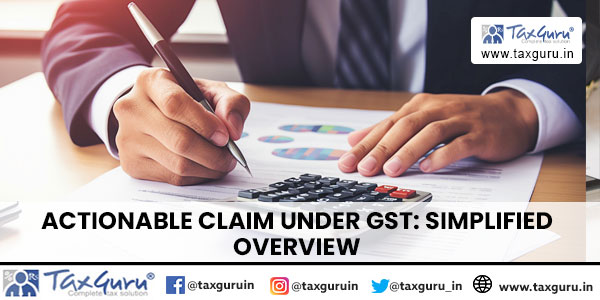Actionable claims hold significant importance in the context of the Goods and Services Tax (GST) law. Defined under Section 3 of the Transfer of Property Act, 1882, these claims include debts and beneficial interests in movable property that are not in possession. The GST law recognizes actionable claims as goods, with the Supreme Court affirming this in the Skill Lotto Solutions (P.) Ltd. v. Union of India case. This article delves into the definition, types, judicial interpretations, and taxability of actionable claims under GST.
Definition and Validity:
- The term “goods” under GST law includes “actionable claims”.
- This inclusion was upheld in the case of Skill Lotto Solutions (P.) Ltd. v. Union of India [2020] 122 taxmann.com 49, where the Supreme Court confirmed its validity.
- As per the CGST Act, “actionable claim” is defined in Section 3 of the Transfer of Property Act, 1882.
GST Implications:
- According to Schedule III of the CGST Act, actionable claims (except those related to lottery, betting, and gambling) are neither treated as goods nor services.
- Consequently, only activities related to lottery, betting, and gambling are subject to GST.
Definition of Actionable Claim:
- Under Section 3 of the Transfer of Property Act, an actionable claim includes claims to debts (excluding those secured by mortgage or pledge) and beneficial interests in movable property not in possession, provided these are recognized by civil courts.
- Actionable claims can be assigned or transferred according to Section 130 of the Transfer of Property Act.

Types and Examples of Actionable Claims:
- Unsecured debts and beneficial interests in movable properties not in possession are actionable claims.
- Claims such as arrears of rent, provident fund, and insurance money are examples.
- Rights to sue for a dissolved partnership’s account or infringement of unregistered intellectual property are also actionable claims.
Case Law and Judicial Interpretations:
- DEPB credit, where no legal action is required for realization, is not an actionable claim (Jindal Drugs v. State of Maharashtra).
- Judgment debts or decrees are not actionable claims since no action is required to realize them (Jugal Kishore v. Raw Cotton Co.).
- A claim to profits contingent on certain events, like a profit-sharing agreement, is an actionable claim (Venkatasamy Jagannathan In re).
- Rights such as those to recover insurance money or rental arrears are actionable claims, as highlighted in various court cases.
Specified Actionable Claims and Taxability:
- Lottery tickets are considered actionable claims and are subject to GST.
- Transfer of unsecured debts, while classified as actionable claims, is not subject to GST because it is essentially a monetary transaction.
- Secured debts transferred through securitization are not considered actionable claims and are treated as monetary transactions, thus not subject to GST.
- Beneficial interests in movable properties not in possession are actionable claims and subject to GST.
Conclusion: The concept of actionable claims encompasses a variety of claims to debts and beneficial interests in movable properties. While GST law generally excludes actionable claims from its purview, exceptions exist for activities related to lotteries, betting, and gambling. Understanding the nuances of actionable claims, including their definitions, types, and tax implications, is crucial for navigating the complexities of GST compliance.



